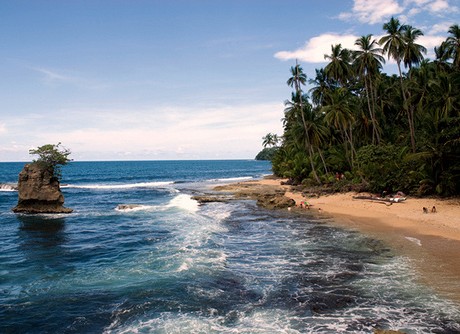Costa Rica News – Whether you are young or old, it’s hard to avoid feeling like Chicken Little in the job market these days. One report suggests that graduates are finding it harder to find a job now than at any time in the last 20 years. Another shows that if you lose your job, you will be unemployed for an average of 36 weeks. This means you have a good chance of spending months (even years) pounding your head against the gates of employment, hoping that being second assistant secretary to the VP of the chess club will get you through that crucial first round interview for an entry-level position.
 THE RISE OF DESTINATION ENTREPRENEURS
THE RISE OF DESTINATION ENTREPRENEURS
What if I told you there was another way? A way that would allow you to be your own boss, to have a crazy adventure in an exotic location, and to gain real-world experience that will make you a hot commodity in the job market?
Destination entrepreneurs are everyday people who ditch their 9-to-5 life to set up shop in a developing country. This may seem crazy or difficult, but it is well within your reach and it makes a lot more sense than you think. Here is why:
1: IT’S CHEAPER TO START A BUSINESS OVERSEAS THAN TO BE UNEMPLOYED IN THE CITY YOU LIVE IN
It makes sense to live in a big city because that is where all the jobs are. However, it is seriously expensive. Putting four walls around you will likely cost $2,000 a month for a one-bedroom apartment if you live somewhere like New York, San Francisco, Boston, London, Sydney, Singapore, Hong Kong, or Tokyo. This obviously doesn’t count utility bills, food, entertainment, or other expenses you will definitely incur.
Dan Prescher and Suzan Haskins of International Living recently wrote a best-selling book about how easy it is for two people to live very comfortably in countries like Ecuador, Costa Rica, and Panama on a combined budget of less than $25,000 per year. This budget includes extras like dining out at least once a week, comprehensive international health insurance, getting someone to clean your house regularly, and flying back to the U.S. once a year. To give you a real example of how cheap things can be, Dan and Suzan’s average monthly cost for electricity, water, and propane in Ecuador is $28. A meal out on the town costs $5.
What this means for you is that it is probably cheaper to move overseas and start a business than to be unemployed and looking for work in one of the aforementioned big cities.
Have I got your attention yet?
2: YOU GET TO DO WHAT YOU LOVE, IN A BEAUTIFUL PART OF THE WORLD
Destination entrepreneurs are people who follow their passion to establish any kind of business imaginable–from massage practices in Machu Piccu, safari companies in the Serengeti, punk-rock record labels in China to beach bars in Costa Rica. Whatever you love doing, no matter how random or weird it is, there is a business opportunity waiting for you. Many developing markets are extremely under-served and lack competition, and therefore offer a low-cost entry point into the business world. Just make sure you have patience, because things may not move as quickly as you are used to.
And if you are going to do something you really love, why not do it in a beautiful part of the world? There are nearly 200 countries, and almost like different meals at a buffet, each one will appeal to slightly different people. Whether you enjoy the cold or the warmth, the beach or the mountains, cities or the countryside, do your research and make sure you are a good fit for whatever country you end up in.
3: YOU DON’T NEED BUSINESS EXPERIENCE
You really don’t need any business experience to start a business. That is as true in the U.S. as it is in Africa, Asia, or Latin America. For example, when U.K.-born Kristie Robinson started her English-language newspaper in Argentina, she had never run a business before and she had only $6,000 in her bank account. Her newspaper was acquired three years after she started it. When U.S.-born Bonnie Futterman purchased a bar in Costa Rica, she didn’t speak Spanish, had never lived abroad, and didn’t have any experience running a business. Her bar has been profitable from her first day, and she recently sold it so she could keep traveling around the world.
While you don’t need business experience, what you do need is experience in the country you intend to start a business. This can be achieved by living there for a period of time before actually attempting to start something. However you do it, you need to be surrounded by your customers and understand the local market. By doing this, you will start to see how you can use your passion to start a business that has a good chance of success.
4: WHAT’S THE WORST THAT WILL HAPPEN?
The worst that will happen if your business fails is that you will have had a real adventure and had awesome, life-changing experiences. You will come back home a changed person and know the world as a bigger place than when you left.
The financial consolation prize (and it’s a big one!) is that you will now stand out in job interviews. Gone are the days when you leaned heavily on your position as second assistant secretary to the VP of the chess club. Now, you are the person whose resume looks different. Now you have something great to talk about in interviews.
The best that will happen?
You love your life, make your business work, and decide to stay a Destination Entrepreneur a while longer. You will have created your own job, become your own boss, be living in a paradise of which your friends are envious, and you always have the option of going home.
WHAT’S NEXT?
Becoming a destination entrepreneur isn’t the answer to everything and it’s definitely not for everyone. However, if you are tired of the job search, bored being a 9-to-5 desk jockey, or just feel like you are stuck in a rut, it could be exactly what you need.
Join me as we explore the stories of 20- to 40-somethings who are starting interesting businesses in interesting parts of the world. The Destination Entrepreneur series will focus on their motivations, how they did what they did, and share key takeaways that will help you follow your own passion.
By Hugh Whalan
This is the latest in Hugh Whalan’s series on Destination Entrepreneurs, which explores the stories of 18 to 40 year olds who have started cool businesses in exotic parts of the globe–typically with no business experience and very little money to their name. The series interviews Destination Entrepreneurs to understand how they did what they did, and share key takeaways that will help you follow your own passion. You can find accompanying podcasts on this topic here.

